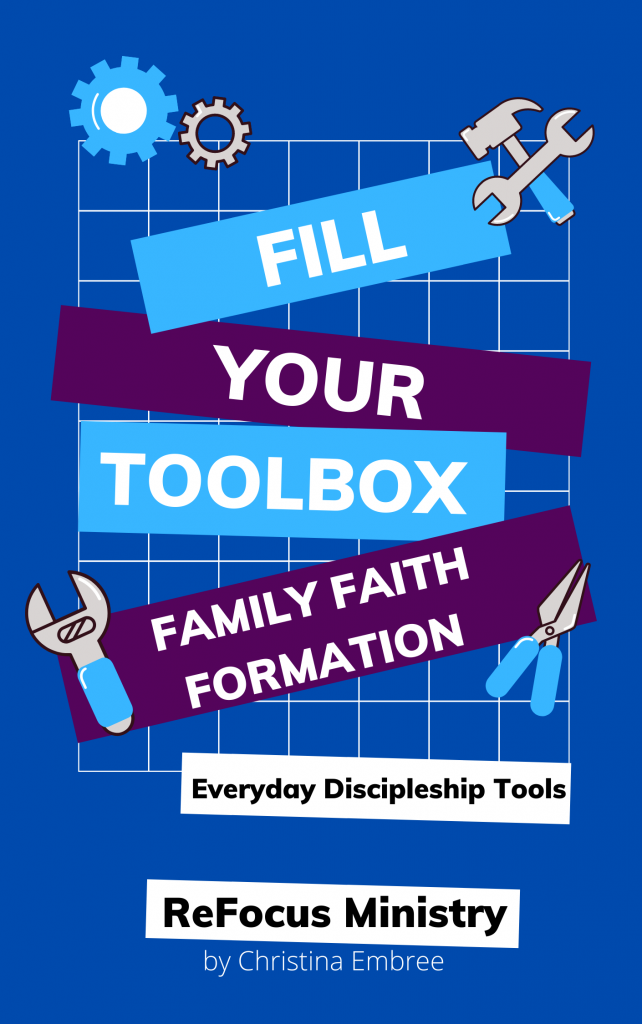“Thank you for being committed to being in church with your child. In order to allow those seated near you to engage in the message, please enjoy the remainder of the service in our lobby…A Connection Team Member will assist you.”

This message was printed on a card handed to a parent in attendance at a church she was visiting with her family. There is a lot to unpack here, I know, but I’d like to focus in on some of the unspoken messages that might be understood from the sentiment on the card. Much of what influences us as people, what shapes us, molds us and forms us doesn’t come in overt ways, but in consistent and unspoken messages that tell us who we are, what we mean, and why where are here.
The context of the message above matters for these very reasons.
This card very clearly says that there are some people who are welcome in the corporate assembly and some people who are not. It tells parents that they are not welcome to have their child attend worship services with them. It lets children know that there’s no place for them in the corporate gathering of the congregation. It also assumes that children and their parents will be a distracting detriment to the service, a bother to other people (adults), and that their proper place is outside the doors, not inside.
And these messages matter… a lot.
Because regardless of what one thinks about children and youth being included in the corporate assembly, we can’t deny the fact that when we read the stories of those who have chosen to leave the institutional church and in some cases their faith, these are the messages they heard and they repeat back as part of their reason for leaving. Messages of not belonging, not having a place, not being wanted or welcomed, not being known. Messages like, “Thank you for coming. Please leave.”
One of the most common concerns I hear about including children and youth in the corporate gathering is that they don’t get anything out of it. People will share their own stories about how church was so boring and all they did was waste time coloring or crawling around the pews.
My first response to them is, “But look, you remember. You remember being in church. You remember seeing the people and hearing the voices and watching the way the service unfolded. It’s part of your forever memory.”
And that’s part of the bigger picture. Children remember.
So what if we used that time when they are in church to do something more; to connect to that memory in meaningful ways? What messages are we sending, spoken or unspoken. Rather than leaving children with negative impressions, why don’t we work to ensure positive ones? Of course, there will be some “boring” moments in church, but what if they also remember…

…that lady who always asked me how school was going and came to my tee ball games
…that man who always had the lollipop that he gave to mom for me and told me how glad he was to see me
…that young adult who sat with me and colored every week and helped me to memorize the Bible verse
…my mom holding me and letting me lay my head in her lap as we listened to the sermon
…my pastor who always told a story or mentioned the kids at least once in the sermon so we understood what was going on.
…that older lady who always told me every week that she loved me and was praying for me
Children remember LOVE.
This is integral to our growing up years. How we perceive love and how we see love acted out around us speaks volumes. In an article by Psychology Today, we (adults) are reminded to “be creating moments with our children that will reinforce their connection of love with us, but also encouraging and modeling the moral mindset towards love one ought to have.”
What better place to do that than at church? And what better place than with the full congregation, all ages and generations, modeling love?
This should not only be the message of our subtext, it should be our overt, out loud, very explicit message – You are loved and you are welcome! When we reduce our corporate gatherings to a sermon or to a worship set or to a service time, we miss the much bigger picture. Our corporate assembly is when we have the opportunity to be Jesus to each other, to show love to each other, to sit and stand with each other, to hug each other and to hear each other. And those things are remembered. Love is etched on our hearts. So is rejection.
So what brings people back to church?
In his article, Four Reasons I Came Back to Church, Christian Piatt gives four reasons: Community, having a voice, finding deeper meaning and a sense of belonging. The subtext of these reasons is simple to deduce: I was welcomed to be part of something bigger, something meaningful, somewhere where I was truly wanted and my voice was valued and I knew I belonged.
We can send that message now. We don’t have to wait for them to leave and hopefully come back. And we don’t have to write it on a card; we can speak it through our lives.
A similar previous version of this article can be found here.
Summer is the Time to Connect!
Special offer for churches ready to build a discipling community.
Connect Generations, a ministry assessment tool that can be done by a church in less than a week that offers specific insight into the barriers and bridges to connect generations and bring your community together.
We’re so convinced that this tool will transform discipleship in your church, we are offering a SPECIAL promotional offer for the summer. Use the code CONNECTSUM to get 25% off your Connect Generations Ministry Assessment Tool including personalized feedback and a FREE 30 minute coaching session.
Family Faith Formation: Fill Your Toolbox
The heart of Family Faith Formation is families spending time together around the Word of God within the context of the larger faith community.
Many parents express frustration about the lack of support and equipping they experience when it comes to leading their kids spiritually at home. Churches often encourage parents that they are the ones who are called by God to disciple their kids but frequently don’t provide the training, experience and resources needed for them to feel adequately prepared for that work.
Our Fill Your Toolbox curriculum gives parents what they need and churches what they desire. Each block contains five lessons focused on introducing, learning, and practicing specific discipleship strategies.

Christina Embree is the founder and director of ReFocus Ministry. She holds a masters in ministry focused on Children, Youth, and Family Ministry and a doctorate in spiritual formation with a focus on age segregation and intergenerational ministry. In addition to coaching churches of multiple denominations and traditions all around the globe, Christina serves as the Minister of Generational Discipleship for the Great Lakes Conference of the Brethren in Christ and as a pastor at Plowshares Brethren in Christ in Lexington, Kentucky. She is widely recognized as a speaker and author in the areas of generational discipleship, intergenerational ministry, and family ministry. As the mother of three children, she is familiar with the challenges of faith at home and pastoral ministry. She along with her husband Luke share a love for the church, their community, and the global work of peace and restoration through Jesus.




3 Comments
John Nixdorf
Babies crying, little kids fussing, tweens giggling, teens passing notes and whispering.
These are all the sounds of life, you don’t want to sterilize your worship service by driving them out.
Besides: but Jesus said, “Let the little children come to me and do not hinder them, for to such belongs the kingdom of heaven.” Mt 19:14
Hetty
I agree wholeheartedly with the article however we must also address the issue of parents who believe anything their children do is okay. It isn’t. Church comes with a protocol on how we should behave and I understand the frustration some people have when there are children near them who aren’t behaving in the appropriate manner. Church leaders have the responsibility to conduct all-age worship services. Parents have the responsibility to ensure their children act in a way that brings honour to God.
christinamembree
Thanks for sharing your thoughts! I would ask you to consider where the “protocol” you refer to comes from. Does it come from Scripture? Or does it come as a result of how we “do” church and the expectations we place on certain behaviors and responses due to societal norms? Is it possible that our approach to how we do church actually shapes the responsibilities you describe? I wonder if a better approach might be one of emphasizing community and considering the needs of others as more important than our own. It could be in that kind of a communal atmosphere more grace could be extended to interruptions and behavior would be more about loving others (which would include not interupting worship or fellowship times). Perhaps there are ways to approach these concerns that allow for more growth and more community.